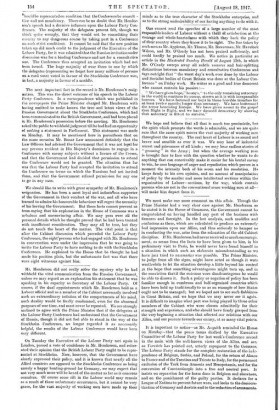We must make one more comment on this affair. Though
the Prime Mieister had a very clear case against Mr. Henderson as he stated it in the House of Commons, the Government cannot be congratulated on having handled any part of the business with firmness and foresight. In the last analysis, such muddles and confusions as these, which are calculated to produce an extremely bad impression upon our Allies, and thus seriously to hamper us in conducting the war, arise from the relaxation of the old Cabinet discipline. If Mr. Henderson had never received so much encourage- ment, as seems from the facts to have been given to him, in his preliminary visit to Paris, he would never have found himself in a situation in which such an elaborate misunderstanding as We have just tried to summarize was possible. The Prime Minister, to judge irons all the signs, might have acted as though it were worth while to let the situation develop a little beyond his control in the hope that something advantageous might turn up, and in the conviction that if the outcome were disadvantageous he would be able to disown it. Such a policy or negation of policy has been familiar enough in cumbrous and half-organized countries which have been held up traditionally to us as an example of hew States ought not to be managed; but we hoped not to see such flabbiness in Great Britain, and we hope that we may never see it again. It is difficult-to-imagine. what part was being played by theee other members of the Cabinet who were chosen admittedly for their strength and experience, and who should have. firmly grasped from the very beginning a situationthat-affected our relations with our Allies, and our posture towards our enemy, at so many vital:points:


























 Previous page
Previous page